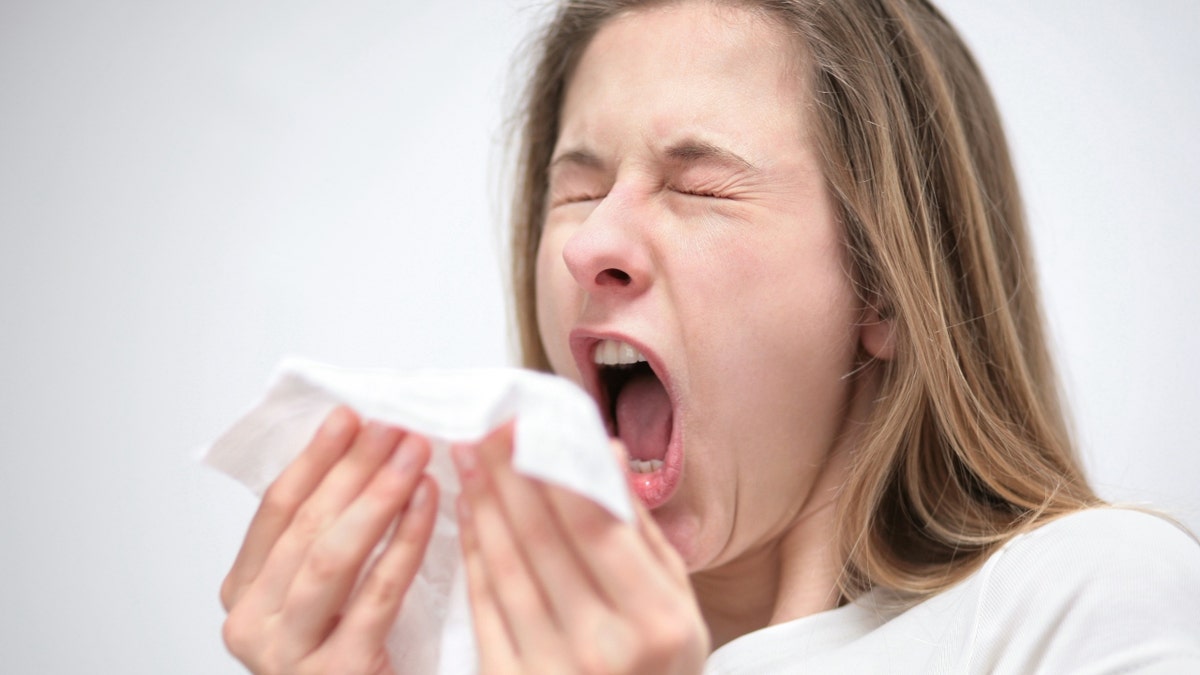Fox News Flash top headlines for December 3
Fox News Flash top headlines are here. Check out what's clicking on Foxnews.com.
People who suffer from allergic conditions have a lower risk for developing COVID-19, according to a new U.K. study.
The research from the Queen Mary University of London was published Thursday in the journal Thorax.
Analyzing data from more than 16,000 adults between May 1, 2020, and Feb. 5, 2021, the authors asked participants to provide information about their age, household circumstances, job, lifestyle, weight, height, longstanding medical conditions, medication use, vaccination status and diet and supplement intake upon enrollment in the study in an online questionnaire.
Monthly follow-up questionnaires captured incident COVID-19 and the researchers used logistic regression models to estimate the associations between potential risk factors and the odds of developing COVID-19.

A woman sneezes (Credit: iStock)
15,227 people – with the majority women and nearly 95% who identified their ethnic origin as White – filled out at least one follow-up questionnaire and 14,348 people completed the final questionnaire. The average age of the participants was 59.
In total, 446 cases of coronavirus were recorded, or nearly 3% of participants. Thirty-two people were admitted to the hospital.
Those with atopic diseases like eczema and those with hay fever or rhinitis had a 23% lower risk of contracting the disease.
Including people who suffer from asthma, there was a 38% lower risk of infection – even after accounting for the use of steroid inhalers.
MORE AMERICAN ADULTS LIVING ALONE, CENSUS BUREAU REPORTS
Taking immunosuppressants was also associated with 53% lower odds of infection, although the authors noted this statistic may reflect greater shielding from infection by these patients.
Contrary to past studies, the researchers found that older age, male sex and other underlying conditions were not linked to a higher risk of infection,
Alternatively, people of Asian and Asian British ethnicity, household overcrowding, socializing indoors with other households, holding a front-line occupation excluding health and social care and raised body mass index or obesity were independently associated with a heightened risk.
Adults who were Asian or Asian British had twice the risk of testing positive compared with White U.K. adults and the greater the number of people sharing a household and the higher the number of visits made to indoor public places, the higher the odds of getting COVID-19.
The researchers said the study shows that there is limited overlap between risk factors for developing COVID-19 and those for ICU admission and death, as reported in hospitalized cohorts.
They also note that the study is observational and cannot establish cause.
CLICK HERE TO GET THE FOX NEWS APP
Other limitations include that there was no oversight of COVID-19 swab testing and the reliance on results of testing usually prompted by symptoms – potentially missing asymptomatic SARS-CoV-2 infection.
In addition, ethnic minorities were underrepresented in the study.



